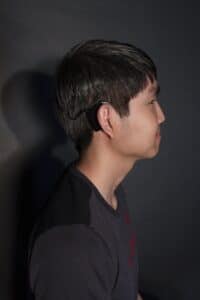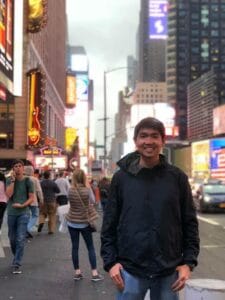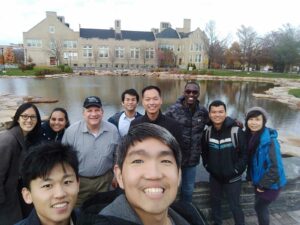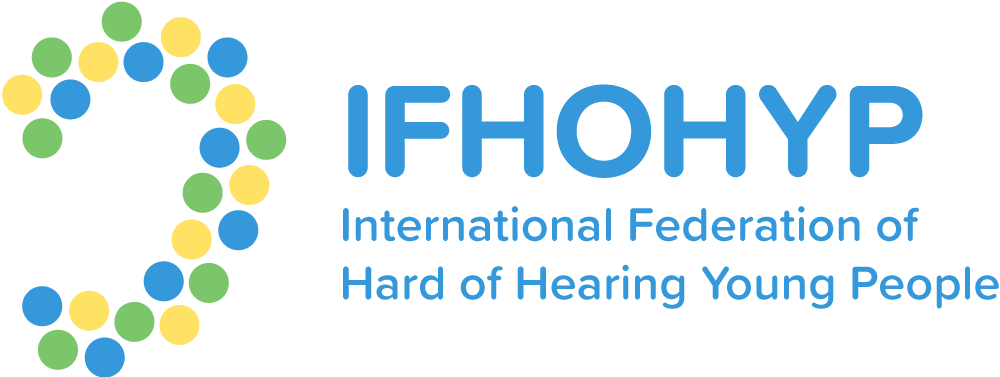How to speak about the unspoken? A question raised by Le Peng Tee from Malaysia, who is collecting the stories of CI users within Cochlear Implants Project. He is striving for a communication between people with hearing loss in order to find a way to advocate for our rights and expressing our needs; he even became a part of IFHOHYP’s Accessibility Committee! But, that doesn’t embrace his whole personality, immersed in different cultures and languages. It’s time to be all ears to someone, who always takes time to listen to others’ stories!
MARIA: I would like to give you a chance to introduce yourself and tell us your story instead of just copy-pasting information that can be found on the Internet. How would you present yourself?
PENG: I present myself as someone who speaks out about the unspoken. There’s been much emphasis on various hearing technologies. For instance, we talk about how cochlear implant processors and hearing aids are getting more and more invisible. Not to say it’s a bad thing, but I think it doesn’t address the fundamental question of full acceptance of our deaf/hard of hearing identity.
Growing up, I didn’t want to have a close association with the deaf or hard of hearing community. I wanted to be able to lead a life without being overshadowed by a deaf identity. In a way, I was a bit snobbish. Later on, when I turned my early 20s (I’m 25 now), I thought that didn’t make sense: “Why am I treating my cochlear implant as something that detracts my self-value when it was supposed to empower me?”
That’s when I started having the intention of reaching out to fellow young adult cochlear implant users. I searched on Google, followed cochlear implant-related Facebook groups and also followed cochlear implant-related hashtags on Instagram. I launched the CI Project website in October 2019, during my last semester of university.
I also started a survey to understand the experiences of cochlear implant users (i.e. how they do in terms of education, career and social life). I published these findings recently. Here’s the article. I believe there’s a need to focus on the quality-of-living outcomes of CI users, like access to job opportunities, job satisfaction and social support. We first measure where we are now, then we know what to improve on.
I guess it demands a lot of patience and paradoxically, listening skills to gather experiences of other people, am I right?
It does require adaptation along the way. The interviews on CI Project are done via video call unless it’s not possible (e.g.i.e. couldn’t work out the time zone difference). In some cases, I typed the questions on the chat window. In some other cases, I shared the list of interview questions in advance so that both the interviewee and I could have a sense of what the conversation will be about. While it’s not a seamless experience throughout, it’s great to engage with fellow CI users!
What influenced your decision to reach young adult cochlear implant users? As this decision/shift, after years of living without any association to the deaf or hard of hearing community, had to be quite radical. And how do you feel after that?
My mind changed when I started reflecting on my life more critically. I didn’t have much mental space and time to reflect on life when I was in primary and secondary school. I was fully occupied with my studies. I wanted to get good grades so that I could get into a top university.
When I entered university, I began thinking about a lot of things that I never thought of before. For instance, why didn’t I make friends with anyone from the deaf and HOH community? And how’s that impacting me? I realized that being deaf (having a cochlear implant) had always been something I didn’t want to talk about, as I thought it’d make others belittle me/perceive me as a lesser being. I asked myself where such thoughts came from. I realized that it was a product of my culture. Within my culture, people tend to celebrate ‘successful’ events (i.e. getting into a top university, getting a prestigious job, buying a car), but not individuals. Unlike in the U.S., we rarely talk about celebrating differences.
As I began to have such realizations, I started to build my own identity rather than just going with the mass. Being deaf (and having a CI) is a major part of who I am. It should something that drives me in my life rather than a nuisance.
The process of reaching out to young adult CI users online was an eye-opening journey. I’ve learned that many are speaking out about their deafness and advocating for their needs. They’ve inspired me. I want to be a part of such a group of people. So to answer your question, it felt liberating and great!

I found it interesting that you wanted to live a life without being overshadowed by deaf identity. Personally, I think that we need a balance actually, not let hearing loss totally take over control of our lives, because we’re much more than people with hearing loss. However, at the same time we should take into account that our hearing loss has shaped our life in different way. What do you think, how much impact does your deaf identity have on you?
My deaf identity actually gives me a sense of direction in life nowadays. My experience growing up deaf (and with CI) could’ve been better – how? The raising deaf kids could be less stressful (and more energizing) – how? Hearing devices are not cheap – how can we make it more affordable? I’m on the journey of learning more about these problems. And see what we can do about them.
You’ve done a great job with survey. I think this topic is important! What would you like to do further with these results?
I hope to connect with more people on these issues and sharing those findings. For now, I’ll continue collecting CI user stories (I’ve collected 14 so far). We’ll see how things go from there.
How do others perceive you when you’re disclosing your hearing loss? In which way do you present yourself when meeting someone new?
Actually, I could never know how others perceive me. It’s more of a matter of the inner voice within me. I ask myself, could I see my deafness with a sense of respect and dignity – without feeling the need to hide it? I make a point to disclose my deafness in the initial conversation with someone new. I’ll say “If you notice, I wear a hearing device on my right ear. That’s my cochlear implant speech processor. I was born deaf and this CI helps me to hear.”
But many times, when there’s little opportunity to properly share about my CI, I’ll just lean my right ear when listening to the other person and say “I hear better with my right ear.”
In your culture, does it mention differences at all? How CI/HA users are perceived in your society?
Rarely. There’s very low visibility of people with hearing aids or cochlear implants here in Malaysia. If you look at the social media accounts of those using hearing aids/cochlear implants in Malaysia, you won’t know that they’re deaf because we rarely disclose it.
I hope that the invisibility of HoH/Deaf people in Malaysia will be changed thanks to the actions taken by you and others! You mentioned at some point about university, what have you been studying? Furthermore, how did you end up in the U.S. for school, coming from Malaysia?
I first attended Hong Kong University of Science & Technology (HKUST) after high school in 2014. I studied Global Business, but dropped out after three semesters and returned to Malaysia in 2016. In the same year, I enrolled in an American Degree Transfer Program at a local private university. I transferred my studies to State University of New York (Plattsburgh) in 2018. I graduated with a bachelor’s degree in Sociology in December 2019.
Was that difficult for you to completely change cultures?
I found myself feeling more comfortable with myself when I was in the U.S. International students make up less than 10% of the student population at my school. So, it was quite an American environment that I was in. I felt free because I could feel a strong sense of freedom of expression. My peers were pursuing their interests. My professors were very dedicated to listening to their students. Generally, I felt that the people I was surrounded by made a point to show support and encourage self-expression.

Fun fact: I stopped dying my hair black when I was in the U.S. When I was in Malaysia, I was very self-conscious about having a white forelock, which is a symptom of Waardenburg syndrome (which is also a cause of my deafness). I haven’t dyed my hair since, even after coming home to Malaysia.
It’s amazing you could feel freedom of expression! I also think that gray forelock is quite unique and makes you more extraordinary, so actually nothing to cover 😀 How has Waardenburg syndrome impacted you? And when were you diagnosed with hearing loss?
I was diagnosed deaf (with Waardenburg being the cause) when I was 2 years old. I was implanted with a CI in the same year. The major symptoms of Waardenburg syndrome include deafness, white forelock, and a flat nose tip.
Another dominant feature of Waardenburg syndrome: eyes of different colours. In my case, I have a pair of pale blue eyes – the first in my family (the rest have black eyes).
May I also ask you about language? I guess English is not your mother tongue, however you speak it very well. How did you develop such a good English knowledge? Was that more difficult for you to learn this?
Chinese is my mother tongue. But, I use English much more often in day-to-day situations – at work and at home. I’ve also picked up my national language – Malay. My primary school and secondary school used Chinese as the medium of instruction. There were also English and Malay classes.
To further improve my English skills, I speak English at home with my mother (while speaking Chinese to my dad) and read English articles online. To improve my Malay, I watch TV subtitles in Malay. It took quite some time before I started feeling confident about my English skills. It wasn’t until I was in university, that expressing myself in English became second nature to me.
I’ve heard Chinese can be hard to learn due to slight intonation/accent differences. How do you cope with that? Does it create any problem for you to understand spoken Chinese?
I think attending a Chinese-speaking pre-school has helped me lay the foundation. I attended a Chinese-speaking primary school and a Chinese-speaking secondary school. So, picking up Chinese became a natural outcome for me. Though, my Mandarin (spoken Chinese) is off-tune – meaning the tune isn’t according to the standard but still understandable.
In which language do you think or dream? 😀
English. My Chinese skills are quite rusty now.
It was very brave of you to study abroad. Were you afraid of starting your life in another country? Was it difficult at the beginning to adapt to new conditions of life?
I looked forward to getting out of Malaysia, actually. I have my supportive parents to thank for that. They sent me and my elder sister on a study-travel trip to New Zealand when I was in primary school. And before I started university in Hong Kong in 2014, I went to New Zealand again on a working holiday trip. In my case, the excitement overshadowed the fear. I haven’t been to Europe by the way, would love to visit one day!
Why did you look forward to getting out of Malaysia? And may you one day land in Europe, this continent has a lot to offer! 😉
That’s an interesting question. On one hand, I feel that Malaysia lacks opportunity – meaning that my ideas and talent are less appreciated here. On the other hand, I feel that perhaps I should do something to improve the situation if I think it needs improvement. I don’t exactly know what’s ahead of me now, but we’ll see – maybe I’ll indeed land in Europe one day!
If you could choose one place in the world where you felt at home, which place would it be?
I’d say when I was in New York, where I was for college.
And in which place you were the happiest in your life?
New Zealand – when I was on a 3-month working holiday trip at age 19.
I’d like to ask you, to not overshadow your whole personality now: what is your passion?
I like to write. Specifically, I like to reflect on my own experiences and social issues and write about them. I’ve shared my writing pieces on my personal blog, which was created when I was a freshman in university in 2014. I also spend time watching YouTube videos, especially documentary-styled and NBA videos.
Reflecting on your own experiences and social issues being quite important, when you look back, you can see your own improvements through years. What would you write to your future self if you could send a letter to the future?
“Keep exploring, experiencing and exposing. Stay faithful to God’s word. It’ll lead you to where you need to be at.”
Do you have a specific sentence, motto or quote that is important to you?
“What the reality is?” This is the mantra that has helped me navigate through disappointment, fear of failure and generally negative emotional states.

“Keep exploring, experiencing and exposing” – we could create a 3E rule that would lead us through reality. May these words from present Peng to future Peng stay with us, it’s definitely priceless, to be open for all possibilities!
Credits to: Le Peng Tee (Interviewee), Maria Skoczyńska (Interviewer) and Keegan Noxell (Proofreader)

